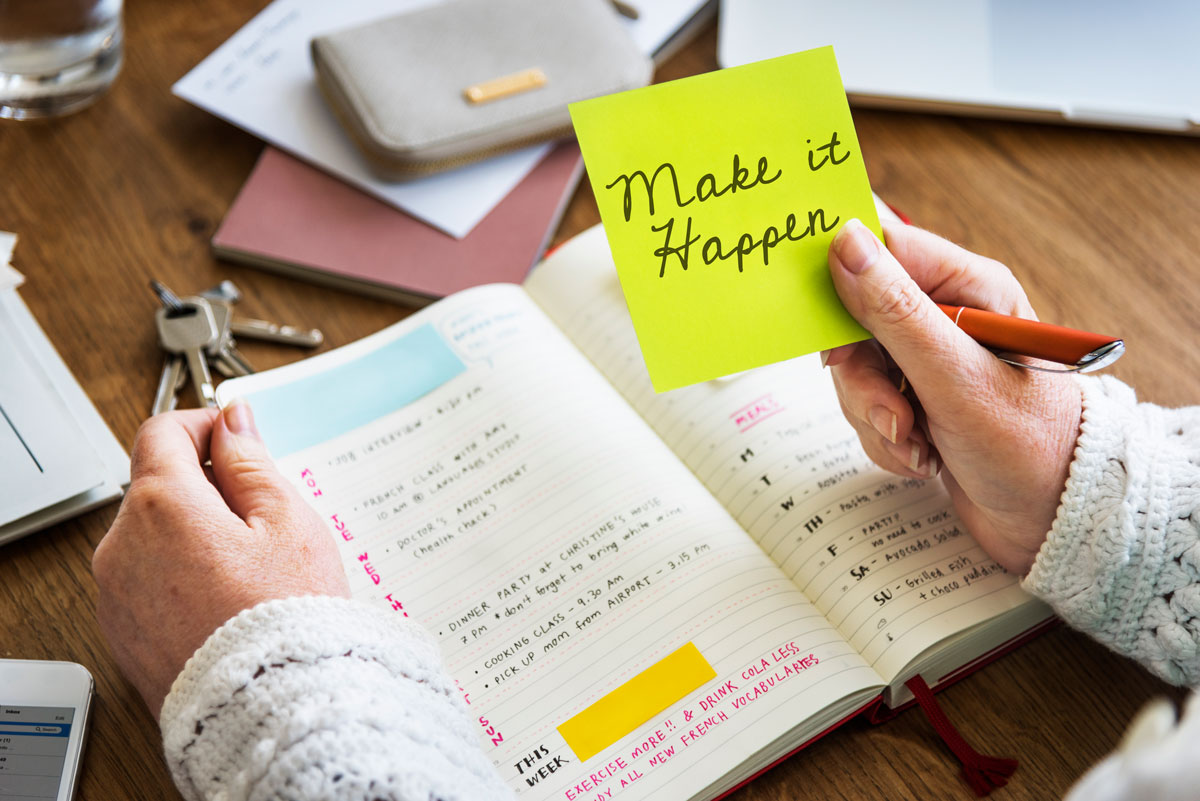The Remarkable Power of Habit:
Strengthen Your Habits and Strengthen Your Brain
I recently began thinking about the importance of habits and their role in navigating our daily choices. Even when we’re not aware of it, habits form structures to manage each day. We open our eyes in the morning, get out of bed, brush our teeth, wash up. We have routines for how we eat, engage with others, deal with routine financial responsibilities. The accumulation of all of our habits, large and small, are the building blocks of our day-to-day lives.
And here’s some amazing news – creating and strengthening our habits can strengthen our brains.
Brain science is showing us that when we change our habits and engage in new experiences, we change the workings in our brains. This process is called neuroplasticity, and it offers extraordinary insight into our brains’ capacity to produce new connections as we learn throughout our lives (Siegel, 2010; 2012). Thus as we focus our attention on new learning, skills, and experiences, our brains change. Research shows that this brain development can continue throughout our lives. Even as we get older – at ages 50, 60, 70, 80 and beyond, when we develop and expand our habits, our brains can develop and grow new neural connections.
In addition to building new pathways in the brain, greater awareness of our habits – both the good and the bad – can inform how we show up in our lives. With this awareness and a few strategic guideposts, we can make choices to maintain those habits that serve us well and change those that don’t.
According to James Clear, author of Atomic Habits (2018), we can get remarkable results by making one tiny change at a time. In the beginning, creating a habit is more critical than actually achieving a goal. He recommends getting just 1% better each day. According to Clear, accumulating habits involves deciding the kind of person you want to be and then empowering your vision with a process of small wins emerging from habits. One step at a time, we create a personal system as these habits inform our way of being in the world.
To be honest, no one has been more awakened by these realizations than I have! Although I coach people on the fundamentals for building habits, I personally have rebelled against the idea of habits, thinking of them as a bit rigid and mundane. Now I understand that we all have habits, and we can harness them so they work for us more effectively.
Here are a few ideas for building the habits you want in life and work:
1. All change begins with making a choice. What habits do you like? Which habits are you willing to take the steps to change?
2. Start your habit change process by building awareness. Pay attention to your current habits and identify one you want to change in some way. Notice your typical procedures step by step. It can help to simply make a list(s) of your daily routines and steps.
3. Attach a new habit or behavior to something you already do regularly. One strategy, called habit stacking (Clear, 2018) connects a new habit to a long established habit. For example: if you want begin walking daily, plan to take your walk right after lunch; to add a moment of mindfulness to your routine, create this time right after you brush your teeth each morning. After I brush my teeth, I will sit down and breathe mindfully for two minutes.
4. Gain clarity about what you want to do and how you will do it. Be specific and bite off just a small chunk. Research suggests beginning with a specific implementation intention or if-then plan (Oettingen & Gollwitzer, 2010). If I’m in this situation, then I’ll do this. For example, if it’s 12 noon,then I’ll stop what I’m doing and walk for 2 minutes. If I want to eat between meals, then I will sit down to consume whatever I choose to eat.
5. Make it easy to do. Let yourself know that one small step at a time can add up to powerful new habits and behaviors. James Clear recommends “the two minute rule” as you begin a new habit or behavior – Break it into a small enough chunk that it can be accomplished in two minutes or less (2018). For example, if you want to begin to lift weights or do yoga, start your practice with just a two minute window – After my morning shower each morning, I’ll get on my yoga mat (or lift weights) for two minutes.
6. Remember the “why”. Keeping in mind why we’re doing something – the personal value, meaning, and importance of a behavior can be helpful. According to performance psychologist, Kate Hays, PhD, during practice and performance it’s pivotal to relate to your purpose, returning to the very personal reasons about why this is important to you. Dr. Hays notes the advantages of working toward being excellent rather than perfect (K. Hays, Personal Interview, July, 2018). This can apply to simple and more complex behavior change.
“The journey of a thousand miles begins with a single step.”
– Lao Tzu
Resources:
- Clear, J. (2018). Atomic habits: An easy and proven way to build good habits and break bad ones. New York, NY: Avery.
- Hays, K. (July 11, 2018). Personal Communication – Interview with Ilene Berns-Zare.
- Hays, K. (2002). Move your body: Tone your mood. Oakland, CA: New Harbinger.
- Oettingen, G. & Gollwitzer, P.M. (2010). Strategies of setting and implementing goals: Mental contrasting and implementation intention.
- J.E. Maddux & J.P. Tangney (Eds.). Social psychological foundations of clinical psychology (114-136). New York, NY: Guilford Press.
- Siegel, D. (2010). Mindsight: The new science of personal transformation. New York, NY: Bantam Books Trade Paperbacks.
- Siegel, D. (2012). Pocket guide to interpersonal neurobiology: An integrative handbook of the mind. New York: NY. WW Norton & Co.
Ilene is a Featured Author on PsychologyToday!
Read her blog series Flourish and Thrive: Navigating transitions with mindfulness and resilience.

When was the last time you introduced a new habit to your routine?
Tap into your strengths, callings, and potential to flourish in life and work.
I have a couple of spots open for new coaching clients. If you’d like to discuss how Ilene Berns-Zare Coaching can help you achieve your goals, Contact Illene.
Coaching with Ilene Can Help You Call Yourself to Action
Ilene Berns-Zare, PsyD, PCC, CMC is an ICF Credentialed Professional Coach and Speaker. Ilene helps people live their best lives by bringing mind, body, and spirit into flow with their strengths, callings and potential. She inspires clients to find fresh perspectives and access their full potential as creative, resourceful, whole persons. Find Ilene online and access free resources at http://ileneberns-zare.com.
FREE Discovery Coaching Consultation
How can coaching help you maximize your personal and professional potential? During this FREE telephone consultation, we become acquainted, explain the coaching process, and mutually establish if we would be a good fit as a coaching team. We discuss your objectives, and how coaching can help you bring out the best in yourself as you strive to reach your most important personal and professional goals. Click here to contact Ilene.
In light and empowerment,
Ilene
Please share this blog with anyone who might be interested in reading it!
We would love to hear from you! We are interested in your suggestions for this newsletter, your reactions to this one, or providing more information about coaching.




